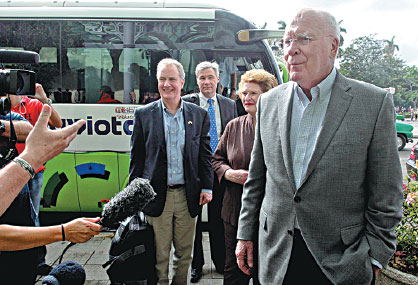US, Cuba work to normalize relations
Two-day meeting in Havana to discuss immigration issues and a road map to reopen their embassies
The United States and Cuba will hold their highest level talks in decades on Wednesday to pave the way to reopen embassies and normalize ties.
Senior US and Cuban officials will meet for two days in Havana to discuss immigration issues and a road map to return ambassadors to each other's nation, more than half a century after full diplomatic relations ended in 1961.
The talks come five weeks after US President Barack Obama and Cuban President Raul Castro simultaneously made the momentous announcement that their countries would seek to normalize ties.
Roberta Jacobson, the US assistant secretary of state for Western Hemisphere affairs, will head the US delegation while the Cubans will be represented by Josefina Vidal, the foreign ministry's director for US affairs.
As the two nations get closer, one person has been noticeably quiet and absent, namely 88-year-old revolutionary leader Fidel Castro. He has not reacted publicly to the rapprochement, sparking speculation about his health.
'No sudden miracles'
The first day of the talks will center on migration - an issue that has vexed both nations for decades, with Cubans hopping on rickety boats to traverse 145 kilometers of shark-infested waters to reach Florida.
On Thursday, the two sides will discuss the process to reestablish diplomatic relations and bring back their embassies.
"I think that Jacobson's visit is, without a doubt, historic and it will bring changes, but it's important to be aware that you can't expect sudden miracles," said Peter Schechter, Latin America analyst at the Atlantic Council, a US think tank.
On Monday, a US congressional delegation, led by Senator Patrick Leahy, was visiting Cuba. Leahy played a key role in the release of US contractor Alan Gross as part of a prisoner exchange that paved the way for the move toward full diplomatic relations.
Cubans have voiced hope that the warming of ties will translate into improvements in their daily lives in a country where supermarket shelves are bare and people make around $20 a month.
Most US citizens approve of Obama's move. A survey released has showed that two-thirds favor lifting the embargo.
While the move will allow more US citizens to visit Cuba and do business with the country, the US Congress still has the final say on ending the embargo.
For its part, the Cuban government completed this month the release of 53 political prisoners who were on a list provided by Washington.
Terror sponsor list
Analysts say this week's talks will allow the two countries to make progress in preparations to reopen embassies. The two countries are currently represented by "interests sections" without ambassadors.
For Cuba, a crucial part of the negotiations will be getting its name out of a US blacklist of nations that sponsor terrorism, which has prevented the government from qualifying for credit from international financial institutions.
"This is not something small, because staying on the list bars access from financial institutions," Schechter said.
AFP - AP
|
US Senator Patrick Leahy talks to the media upon arriving at his hotel in downtown Havana on Saturday. Leahy was leading a US congressional delegation to visit Cuba on Monday. Provided by Reuters |

























